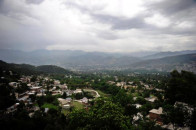Textbooks for our schools: Progress on revised syllabi painfully slow
Officials see emphasis on foreign models at the cost of local relevance.

According to the Punjab Textbook Board (PTB) out of the six books published, four are Class 1 books and one each for Class 6 (general science)and Class 9 (biology).
Another 26 books have been developed and will be published in time for the academic session 2011-12 if the National Review Committee (NRC) issues a no objection certificate for them.
Talking to The Express Tribune, PTB officials blamed the National Curricula policy of 2006 for the delay. They said it was developed along the lines of the models followed in countries such as England, United States, Australia, Singapore and Malaysia. Too much emphasis on foreign models, they said, made the developers oblivious to domestic realities. Besides, they said, most textbook writers had no training or experience in the field. They added that in most cases it was impossible to cover the prescribed range of learning outcomes using a single textbook.
Another factor in the dealy, the officials mentioned, was the lack of adherence to the procedures put down in the NTLMP. They said that the procedures outlined in the policy and the timeframe set by it were not being followed by the administration.
They added that more often than not textbook boards disregarded the policy allowing them to invite private publishers by advertising in newspapers for a maximum of two times.
The officials further said that the selection procedure of the Provincial Review Committee (PRC) members was also flawed.
They added that this was compromising the quality of work done at the PTB. They said that the selection procedure gave no weight to the seniority of the academic experts (including assistant subject specialists and directors).
The PTB officials said that most people authorised by the PTB to review the manuscripts were incompetent. They said that under the 2007 policy even an assistant to a subject specialist could review the manuscripts.
Before this policy, they said, manuscripts were only sent to the senior subject specialists.
The manuscripts prepared by the publishers are first reviewed by the PRCs. After PRCs evaluation, the revised manuscripts, if deemed satisfactory by the subject specialists, are sent to the National Review Committee in Islamabad for the issuance of an NOC.
A publisher, seeking anonymity, said that there was a lot of confusion in the new policy. He also criticised the PTB for its handling of the textbook development process, saying that he had invested heavily and hired competent writers but was not confident of success under the current policy.
Former DPI (director public instruction) Jameel Najam stressed the need for reconsidering the National Curricula of 2006 and the Textbooks and Learning Materials Policy of 2007.
He said that federal government should play a bigger role in setting out the curriculum objectives but leave sufficient room for the provinces to accommodate their interests and priorities. PTB Secretary declined to comment.
Published in The Express Tribune, December 4th, 2010.



















COMMENTS
Comments are moderated and generally will be posted if they are on-topic and not abusive.
For more information, please see our Comments FAQ